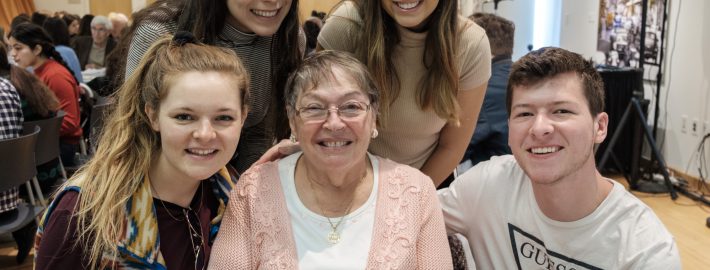LEARNING HISTORY FROM HOLOCAUST SURVIVORS
At age 15, Ann Signett was surrounded by war. Every morning she would go out on her balcony and watch B-17 bombers as they flew over her hometown of Rome during World War II.
Knowing that German occupation meant death for his Jewish family, Signett’s father led them to the mountain village of Alvito, 100 miles away. There they were sheltered by a Catholic family for 10 months.
Signett’s story is just one of the personal histories shared with more than 100 students through UCLA’s student-run Bearing Witness program and the Fiat Lux seminar, “Bearing Witness: Interviewing Holocaust Survivors.”
Bearing Witness hosted four sessions at UCLA Hillel during which students met one-on-one with a group of 25 survivors. The students listen, learn, record and “bear witness” to the unique histories presented to them.
With every passing year, there is urgency on the part of survivors to get their message out. The oldest is 105 and the youngest is 76.
Signett, now 89 and surrounded by UCLA students, shared her story with the hope that it will never be forgotten.
“I survived because I was hidden,” she said. “But there are survivors who survived the death camps. I was never in a death camp. I was the lucky one.”
A group of 20 students learned more about the Holocaust as part of a Fiat Lux seminar taught by professor Todd Presner, who is the Sady and Ludwig Kahn Director at the UCLA Alan D. Leve Center for Jewish Studies.
Presner has partnered with the Bearing Witness program for the last 10 years because he wants to engage students early in their academic careers. As part of his seminar, freshmen discuss historical issues and oral histories, and visit the Los Angeles Museum of the Holocaust.
“Several students, year after year, come back and talk about their experience,” he said. “It deepens their interest in history, their interest in social justice issues, and their interest in community engagement.”
Students stand with survivors
Nadine Avari, a freshman in the UCLA College and originally from Pakistan, was immediately drawn to the Fiat Lux course. It offered her the perfect opportunity to interact with and learn directly from Holocaust survivors.
Before coming to UCLA, Avari says she had neither experienced much diversity nor met anyone from the Jewish community.
“Many freshmen come from really small, closed communities with narrow viewpoints,” Avari said. “UCLA is a diverse campus and hearing about the survivors’ experiences is an opportunity for students to be open and experience cultural diversity.”
Now, after studying the Holocaust in Presner’s class and hearing survivors’ personal testimonies, Avari said she feels empowered to “bear witness” on their behalf.
“There are people who disagree that the Holocaust happened,” Avari said. “And I can say,
‘No, I heard it firsthand from someone who went through it.’ No one can argue with that.”
Carol Roth, 76, is the youngest of the survivors. While Roth calls herself the “baby” of the group, she says that as long as she is living, it’s her responsibility to both educate a new generation and fight Holocaust deniers.
With a shaky voice, Roth tells students of the day she was walking on the beach with her husband and saw a blimp in the sky that read, “The Holocaust never happened.”
“I started crying because it was horrendous,” said Roth, who is originally from Couillet, Belgium. “It’s real, believe me. My mother was arrested by Nazis on the bus only because she was Jewish. They took her to the concentration camp Auschwitz. She was never heard from again.”
Honoring a disappearing generation
Sonia Khrapkova, 80, and a native of Stalingrad, Russia (now Volgograd), is also a child survivor.
In one session with students, Khrapkova shared a sobering reality. “We will go, my generation,” Khrapkova said. “I’m 80 and soon there will be no people to talk to you.”
Although Khrapkova was 4 years old when the Germans arrived in Stalingrad, she tells students that she remembers details from 76 years ago “like it was yesterday.”
She recalled her family’s escape during the decisive Battle of Stalingrad.
“We put logs together, and we were on the Volga River,” Khrapkova said. “We were running and running. The pilots were flying above us; the river was burning; the city was so slippery from the blood.”
Senior Daniella Chernak, a communication major and co-chair of the Bearing Witness program, understands the importance of personally hearing stories from survivors like Khrapkova.
“We are the last generation to bear witness to survivor testimonials and stories firsthand,” Chernak said. “Day after day, week after week, survivors actively choose to relive the unimaginable hardships of their lives by sharing them with us.”
When Khrapkova continued her story, she spoke of fleeing to Kyrgyzstan and eventually Ukraine. It was there, in a small forest, that she witnessed Jewish parents and their children digging their own graves and being buried alive.
“I remember the earth looked like it was breathing,” said Khrapkova, whose family was fortunate enough to survive.
Khrapkova’s tragic memories have endured throughout the decades and are now in the hands of a new generation.
“Hearing survivor testimonial is a constant reminder that we cannot stand idly by while others face atrocities,” Chernak said. “The hundreds of students who participate each year leave the program more open-minded, knowledgeable and committed to stopping biased injustices.”
Today, Khrapkova says that Bearing Witness gives her hope that this period of history will not be forgotten and will live long after she is gone.
“These UCLA students brought back my faith in the future generation,” Khrapkova said. “I am proud.”




